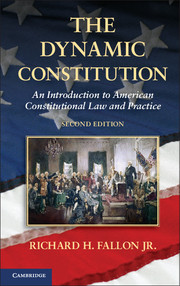Book contents
- Frontmatter
- Contents
- Preface to the Second Edition
- Preface to the First Edition
- Prologue: The Affordable Care Act and Other Vignettes
- Introduction
- Part I Individual Rights under the Constitution
- Part II The Constitutional Separation of Powers
- 7 The Powers of Congress
- 8 Executive Power
- 9 Judicial Power
- Part III Further Issues of Constitutional Structure and Individual Rights
- Appendix: The Constitution of the United States
- References
7 - The Powers of Congress
Published online by Cambridge University Press: 05 May 2013
- Frontmatter
- Contents
- Preface to the Second Edition
- Preface to the First Edition
- Prologue: The Affordable Care Act and Other Vignettes
- Introduction
- Part I Individual Rights under the Constitution
- Part II The Constitutional Separation of Powers
- 7 The Powers of Congress
- 8 Executive Power
- 9 Judicial Power
- Part III Further Issues of Constitutional Structure and Individual Rights
- Appendix: The Constitution of the United States
- References
Summary
The powers delegated by the proposed Constitution to the federal government are few and defined.
– The Federalist No. 45IN 1994, IN SEPTEMBER OF HER FRESHMAN YEAR AT Virginia Polytechnic Institute (better known as Virginia Tech), Christy Brzonkala reported that she had been raped by two members of the school's varsity football team, one of whom allegedly told her, “You'd better not have any diseases.” When Brzonkala pressed a complaint through the college's disciplinary system, officials dismissed the charges against one of her alleged assailants. They found the other student guilty and initially suspended him for two semesters, but the school's provost overturned that punishment as “excessive” in light of the penalties in similar cases.
Rape is, of course, a crime under Virginia law, and Brzonkala might have sought action by the state’s criminal justice system. In general, however, private citizens cannot force prosecutors to bring criminal charges. For a variety of reasons, prosecutors sometimes hesitate to file rape cases, perhaps especially against members of a public university’s popular football team. So Brzonkala filed a civil (rather than criminal) lawsuit of her own in which she sought not to have her alleged assailants sent to jail but to have them pay money damages directly to her. She did so under the Violence against Women Act, a federal statute Congress enacted in 1994.
- Type
- Chapter
- Information
- The Dynamic ConstitutionAn Introduction to American Constitutional Law and Practice, pp. 227 - 252Publisher: Cambridge University PressPrint publication year: 2013



